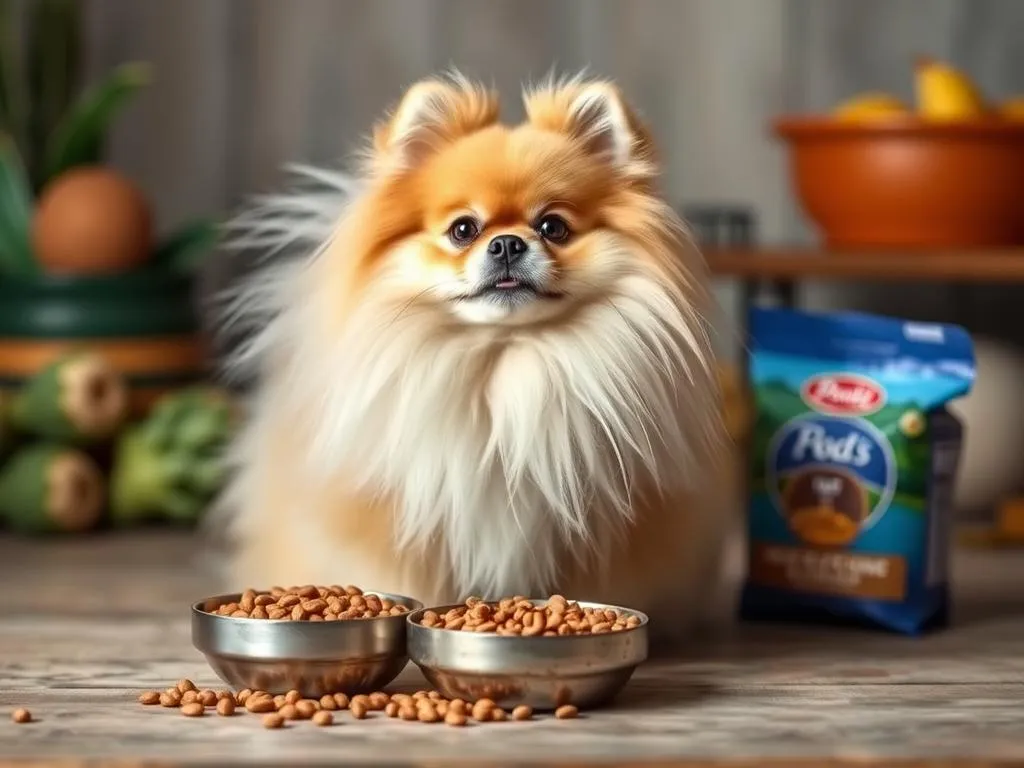
Introduction
Pomeranians are charming little companions known for their lively personalities and fluffy coats. These small dogs typically weigh between 3 to 7 pounds, making them one of the smallest breeds. Despite their size, Pomeranians are known for their big personalities, often displaying a vibrant and playful demeanor. Their high energy levels require a diet that meets their unique nutritional needs, especially since they have a faster metabolism than larger breeds.
Proper nutrition is crucial for all dogs, but it is particularly important for small breeds like Pomeranians. They require a diet rich in high-quality ingredients to support their health, energy, and longevity. This article will provide a comprehensive guide to the best dog foods for Pomeranians, ensuring your furry friend thrives in every stage of life.
Understanding Pomeranian Nutritional Needs
Nutritional Requirements
Pomeranians have specific nutritional needs that must be met to maintain their health and vitality. Their diet should consist of three main macronutrients:
- Proteins: Essential for muscle development, immune function, and overall health. It is crucial to choose high-quality animal-based proteins.
- Fats: Provide energy and support healthy skin and coat. Omega fatty acids are particularly important for Pomeranians.
- Carbohydrates: While dogs can utilize carbohydrates for energy, it’s essential to choose digestible sources that also provide fiber for digestive health.
In addition to macronutrients, Pomeranians require a variety of vitamins and minerals to support their overall health. These include vitamins A, D, E, and B-complex, as well as minerals like calcium, phosphorus, and potassium.
Unique Needs of Pomeranians
Pomeranians have a higher metabolism, which means their energy requirements are greater relative to their size. This necessitates a calorie-dense diet that provides sufficient energy without requiring large portion sizes. Additionally, because of their small mouths and teeth, it’s important to select foods with appropriately sized bites to prevent choking and promote easy chewing.
Types of Dog Food for Pomeranians
Dry Dog Food (Kibble)
Kibble is one of the most popular forms of dog food and offers several benefits:
- Benefits: Kibble is convenient, has a long shelf life, and can help maintain dental health by reducing tartar buildup.
- Drawbacks: Some lower-quality kibble brands may contain fillers and artificial additives.
Recommended Brands:
– Royal Canin Pomeranian Adult: Specifically formulated for Pomeranians, it is rich in nutrients to support skin and coat health.
– Wellness CORE Small Breed: High in protein and made with real meat, it provides balanced nutrition for active Pomeranians.
Wet Dog Food (Canned)
Canned dog food is another option that can be beneficial for Pomeranians.
- Benefits: These foods are often more palatable and hydrating for dogs, making them ideal for picky eaters or those with dental issues.
- Drawbacks: They can be more expensive and have a shorter shelf life once opened.
Recommended Brands:
– Hill’s Science Diet Small Paws: Rich in antioxidants and formulated for small breeds, it supports overall health.
– Merrick Grain-Free Texas Beef & Sweet Potato Recipe: A high-quality wet food packed with protein and nutrients.
Raw Diets
Raw feeding has gained popularity among dog owners who wish to provide a more natural diet.
- Overview: A raw diet typically includes raw meat, bones, fruits, and vegetables.
- Pros: Many owners report improvements in coat condition, energy levels, and overall health.
- Cons: It requires careful planning to ensure a balanced diet and can be time-consuming.
Homemade Dog Food
Preparing homemade dog food can be an excellent way to control the quality of ingredients.
- Guidelines: It’s essential to follow recipes that meet your dog’s nutritional requirements, including proteins, healthy fats, and carbohydrates.
- Essential Nutrients: Include lean meats, vegetables, healthy fats like olive oil, and supplements to ensure a balanced diet.
Key Ingredients to Look For
High-Quality Proteins
Animal-based proteins are crucial for Pomeranians.
- Importance: They provide essential amino acids necessary for growth, maintenance, and energy.
- Good Sources: Chicken, turkey, beef, and fish are excellent protein sources.
Healthy Fats
Fats play a vital role in maintaining skin and coat health.
- Omega Fatty Acids: Important for brain function and reducing inflammation. Look for sources like fish oil or flaxseed oil.
Digestible Carbohydrates
Carbohydrates can provide energy, but they must be digestible.
- Importance of Fiber: Fiber aids in digestion and helps maintain bowel health.
- Recommended Sources: Sweet potatoes, brown rice, and peas are excellent carbohydrate choices.
Essential Vitamins and Minerals
Pomeranians require a balance of vitamins and minerals to stay healthy.
- Key Vitamins: Vitamin A for vision, Vitamin D for bone health, and B-complex vitamins for energy metabolism.
- Importance of Mineral Balance: Calcium and phosphorus are essential for bone health, while potassium supports muscle function.
Foods to Avoid
Common Harmful Ingredients
Some ingredients should be strictly avoided in your Pomeranian’s diet:
- Chocolate: Toxic to dogs, can lead to serious health issues.
- Onions and Garlic: Can damage red blood cells and lead to anemia.
- Xylitol: A sugar substitute that is highly toxic to dogs.
Allergens Specific to Pomeranians
Pomeranians can be susceptible to certain food allergies.
- Common Allergens: Beef, chicken, dairy, and wheat. Look for signs like itching, gastrointestinal upset, or ear infections.
Recommended Dog Foods for Pomeranians
Top Commercial Brands
When selecting the best dog foods for Pomeranians, consider the following brands:
- Royal Canin Pomeranian Adult
-
Highlights: Tailored to the specific needs of Pomeranians, supports coat health, and is enriched with antioxidants.
-
Wellness CORE Small Breed
-
Highlights: Grain-free, high in protein, and made with real meat for optimal nutrition.
-
Hill’s Science Diet Small Paws
-
Highlights: Formulated for small breeds, focuses on immune health and provides balanced nutrition.
-
Merrick Grain-Free Texas Beef & Sweet Potato Recipe
- Highlights: High protein content with real beef as the first ingredient and packed with nutrients.
Comparison Table
| Brand | Protein (%) | Fat (%) | Fiber (%) | Price per Bag |
|---|---|---|---|---|
| Royal Canin Pomeranian Adult | 24 | 15 | 5.5 | $60 |
| Wellness CORE Small Breed | 34 | 16 | 4 | $50 |
| Hill’s Science Diet Small Paws | 25 | 16 | 3.5 | $55 |
| Merrick Grain-Free | 38 | 15 | 4 | $65 |
Personalization of Diets
When choosing the right food for your Pomeranian, consider their individual needs based on age, activity level, and any health conditions. Puppies require a diet rich in protein and calories to support growth, while seniors may need a lower-calorie diet to prevent obesity.
Feeding Guidelines for Pomeranians
Portion Control
Controlling portion sizes is essential for small breeds like Pomeranians. Overfeeding can lead to obesity, which can cause various health issues. Always follow the feeding guidelines on the dog food packaging and adjust based on your dog’s activity level and weight.
Feeding Frequency
Pomeranians generally do well with multiple small meals throughout the day.
- Recommended Schedule: Puppies may need 3-4 meals a day, while adults can thrive on 2 meals. Seniors might benefit from a similar schedule but with slightly smaller portions.
Transitioning Foods
When introducing a new dog food, do so gradually to avoid digestive upset.
- Safe Transition: Mix the new food with the old food over a week, gradually increasing the new food’s proportion while decreasing the old.
Monitoring Your Dog’s Health
Regular Vet Visits
Routine veterinary check-ups are essential for monitoring your Pomeranian’s weight and dietary needs. Your vet can provide tailored recommendations based on your dog’s health status.
Signs of Nutritional Deficiencies
Watch for signs of nutritional deficiencies, such as:
- Poor coat quality: Dull fur or excessive shedding can indicate a lack of essential fatty acids.
- Weight changes: Unexplained weight loss or gain may signal dietary issues.
- Low energy: A sudden drop in activity could indicate inadequate nutrition.
Adjusting Diet Based on Life Stage
As your Pomeranian ages, their dietary needs will change. Adjust their diet based on their life stage:
- Puppies: High protein and calorie intake for growth.
- Adults: Balanced diet for maintenance and energy.
- Seniors: Lower-calorie options with joint support and easier-to-digest ingredients.
Conclusion
Choosing the best dog foods for Pomeranians involves understanding their unique nutritional needs and selecting high-quality ingredients that support their health and energy levels. From the right balance of proteins, fats, and carbohydrates to avoiding harmful ingredients and allergens, every aspect of your Pomeranian’s diet matters.
Regular vet visits and careful monitoring of your dog’s health can help ensure that they receive the best possible nutrition throughout their life. Making informed choices about your Pomeranian’s diet will lead to a happier, healthier, and longer life for your furry friend.









